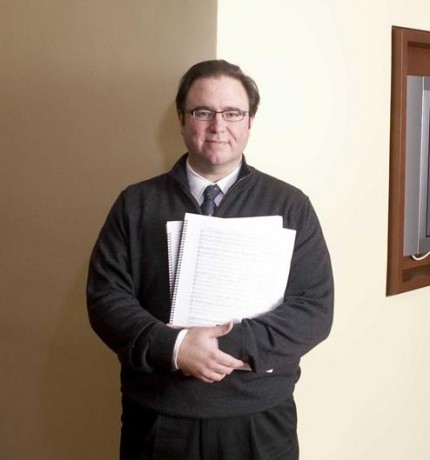Theofanidis’ “Northern Lights” premiere proves less than the sum of its multimedia parts

Christopher Theofanidis’ “The Legend of the Northern Lights” received its world premiere Friday night at the Grant Park Music Festival.
There are two kinds of people in the world: those who like visual film counterpoint to classical music events and those who find it distracting, unnecessary and, often, irrelevant.
The program for the Grant Park Music Festival’s penultimate weekend raised that conflict again Friday night at the Pritzker Pavilion. The first of two commissions to be heard in the final two weeks of the Chicago lakefront festival’s season was the world premiere of Christopher Theofanidis’s The Legend of the Northern Lights, performed by Carlos Kalmar and the Grant Park Orchestra.
With a live action component and video images projected on a massive screen behind the orchestra, Northern Lights is a co-commission between the Grant Park Music Festival, the Adler Planetarium, KV 265 (a Chicago-based nonprofit for “the communication of science through art”), and the Canadian Space Agency. (Was NASA too busy or just more artistically discerning?)
You might expect some artistic confusion as a result of four organizations with possibly nonparallel agendas, and you would be right. The Legend of the Northern Lights is a high-tech multimedia mess that doesn’t seem to know what it wants to be: a classical composition, a high-definition showpiece of nature and the galaxy, or a didactic educational film for schoolchildren.
The good news is that the musical side of things is the most successful element. Christopher Theofanidis is one of our most gifted composers and he has fashioned a work that manages to be engaging, substantial and smartly scored, accompanying the film’s images deftly while not being submerged by the overpowering video counterpoint. This music—which felt significantly shorter Friday than the 30-minute length stated in the program—is good enough to be retooled into a more concise concert work for orchestra sans images.
The film is by Jose Francisco Salgado, an astronomer at the Adler Planetarium and (oddly enough) a cofounder of the sponsoring KV 275. Salgado’s visuals are often striking, especially the planetary and Northern Lights, though a few images appeared to be manipulated, as if the genuine pictures wouldn’t be quite astounding enough. Yet the disjunctive narrative fails to hold together. The would-be dramatic section of a nature spirit visiting a cabin at night seems to come from a ghost story wholly out of left field. And some of the outdoors scenes of the caribou and majestic moose recall CBC nature vignettes as parodied by SCTV (“The woodchuck hibernates in snowy climes.”).
The least successful element is the live introduction with a child asking his grandfather about the Northern Lights and planets. Though capably done by narrator Frank Babbitt and child actor Nicholas Black (son of concertmaster Jeremy Black), the scene feels grafted on to fulfill some educational precept by one of the commissioning agencies.
Carlos Kalmar kept the myriad elements together skillfully and the Grant Park Orchestra fulfilled the musical side solidly with fine violin solos by concertmaster Black.
For likely the first time in history, Rachmaninoff’s Symphony No. 2 was heard on the first half of the program.
One would think this big hour-long, chock-full-of-tunes canvas would be prime meat for Kalmar and the Grant Park Orchestra, but Friday night’s performance proved surprisingly mixed.
Kalmar’s caressing of the long lines seemed to fitfully impede momentum, the melodies too lovingly drawn out in the opening movement and the long-limbed Adagio, the latter unaided by a reedy clarinet solo. Balances seemed off with the corporate sonority sounding thin and lacking heft and definition at the bass end, likely from a bad electronic mix. The long and hectic summer rehearsal schedule told as well in more technical slips than we usually hear from these players.
Still, the Scherzo was aptly vigorous with the big middle tune rich and luxuriant and the finale proved most successful with driving energy and an impassioned coda.